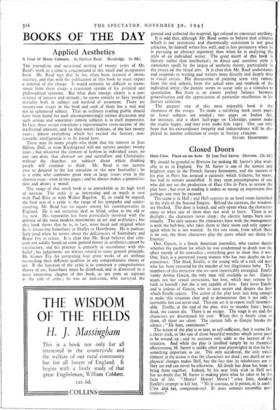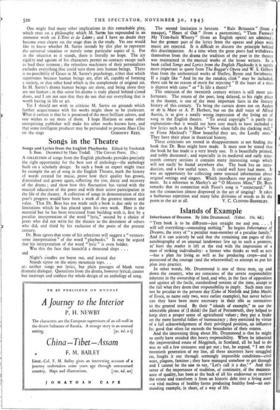Closed Doors
Huis Clos. Piece en un Acte. By Jean Paul Sartre. (Horizon. 12s. 6d.)
WE should be grateful to Horizon for making M. Sartre's play avail- able to us in England. For M. Sartre is one of the newest and brightest stars in the French literary firmament, and the success of his play in Paris has aroused a curiosity which hitherto, for many, has had to remain unsatisfied. It may seem presumptuous of one who did not see the production of Huis Clos in Paris to review the play here ; but even in reading it makes so strong an impression that perhaps one..may be excused.
The scene is in Hell ; and Hell consists in an hotel room furnished in the style of the Second Empire. Behind the curtains, the windows are blocked. The door is locked, and only opens when the characters enter or when one of them does not wish to leave. There is no daylight ; the characters never sleep ; the electric lamps burn con- tinually. The only contact the characters have with the management is with the bell-boy, who takes them to their room and only appears again when he is not wanted. In this one room, from which there is no exit, the three characters play the parts which are theirs for Eternity.
One, Garvin, is a South American journalist, who cannot decide whether the pacifism for which he was condemned to death was the effect merely of his cowardice ; everything goes to show that it was. One, Inez, is a perverted young woman who has two deaths on her conscience. The third, Estelle, is the young wife of a rich old man who has been executed for the murder of her illegitimate baby. The members of this attractive trio are soon inextricably entangled. Estelle vainly desires Garvin, the only man still available to her. Galvin wants not her sexual attractions, but love, which may restore his faith in himself ; but she is not capable of love. Inez loves Estelle and is jealous of Garcin, who in turn envies and desires the love which Estelle rejects. The action of the play lasts just long enough to make this situation clear and to demonstrate that it not only is inevitable but can never end. This one act is to repeat itself intermin- ably. Estelle, at the end of the play, tries to murder Inez; being dead, she cannot die. There is no escape. The stage is set and the characters are determined for ever. When this is finally clear to them, all three are silent. The curtain falls as Garcin breaks the silence ; "Eh bien, continuons."
The action of the play is so neat, so self-sufficient, that it seems like a clever trick, or like one of those beautiful watches which never need to be wound. up ; and its neatness only adds to the horrors of the situation. And while the play is justified simply by its theatrical effectiveness, M. Sartre is unlike other neat playwrights in that he has something important to say. The only accidental, the only trivial element in the action is that the characters are dead ; not death or any physical changes makes Hell, but the fact that its inhabitants are as they are and can never be otherwise. All death has done has been to bring them together. Indeed, by his neat little trick in Hell one has no doubt that M. Sartre is making plain what he takes to be the facts of life. "Morte I Morte! Morte! " cries Inez, deriding Estelle's attempt to kill her. "Nile couteau, ni le poison, ni la cordc. C'est déjà fait, comprends-tu?. Er nous sommes ensemble pour touiours." One might find many other implications in this remarkable play, which rests on a philosophy which M. Same has expounded in an immense work on L'Etre et de Leant ; and I have no doubt they become even clearer on the stage than in the study. Yet one would like to know whether M. Sartre intends by this play to represent the universal situation or merely some particular aspect of it. For in the situation as it stands, there is literally no hope. The icy rigidity and egoism of his characters permit no contacts except such as feed their torment the relentless machinery of their personalities excludes everything that could turn them into human beings. There is no possibility of Grace in M. Sartre's psychology, either that which supervenes because human beings are, after all, capable of forming a society, or that other kind which is the complement of original sin. In M. Sartre's drama human beings are alone, and being alone they are not human ; in this sense his drama is truly played behind closed doors, and I am not sure that they do not shut out everything that is worth having in life or art.
Yet I should not wish to criticise M. Sartre on grounds which further acquaintance with his works might show to be irrelevant. What is certain is that he is possessed of the most brilliant talents, and one wishes to see more of them. I hope Horizon or some other enterprising publisher will make his other works known here, and that some intelligent producer may be persuaded to present Huis Clos































 Previous page
Previous page